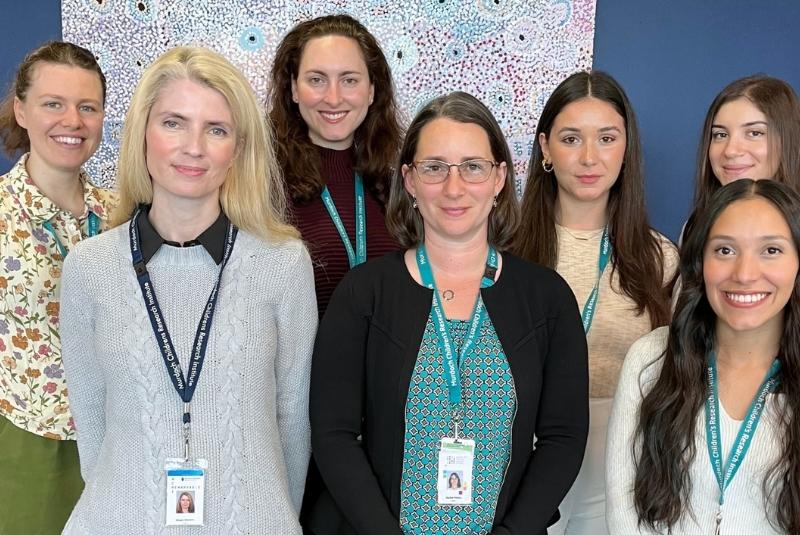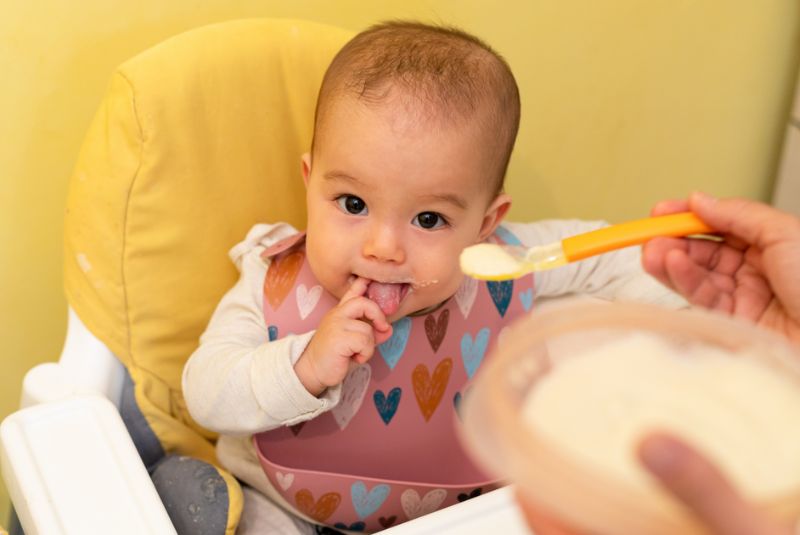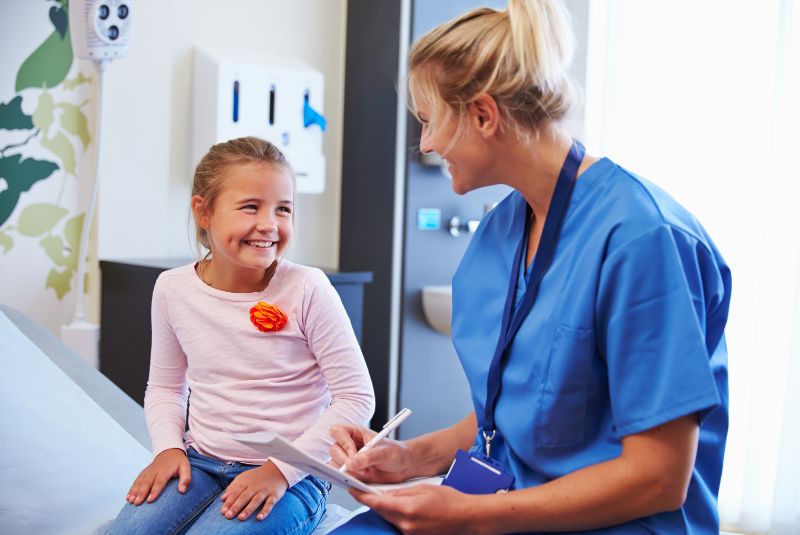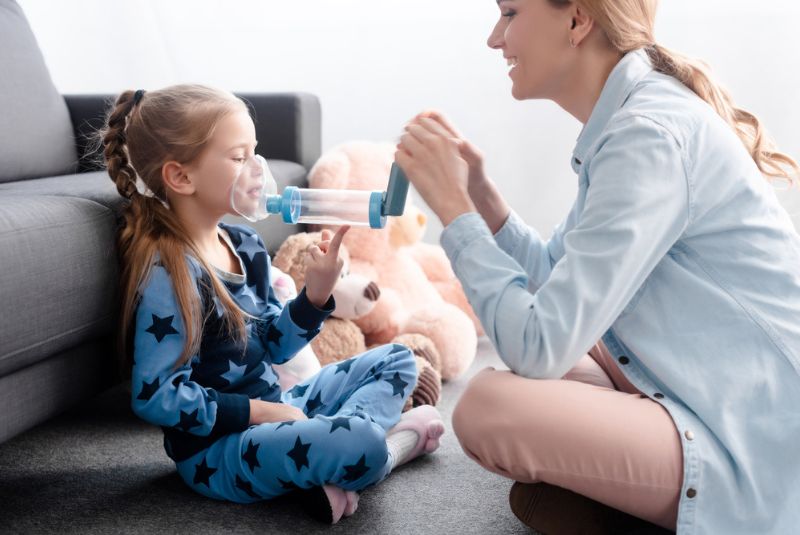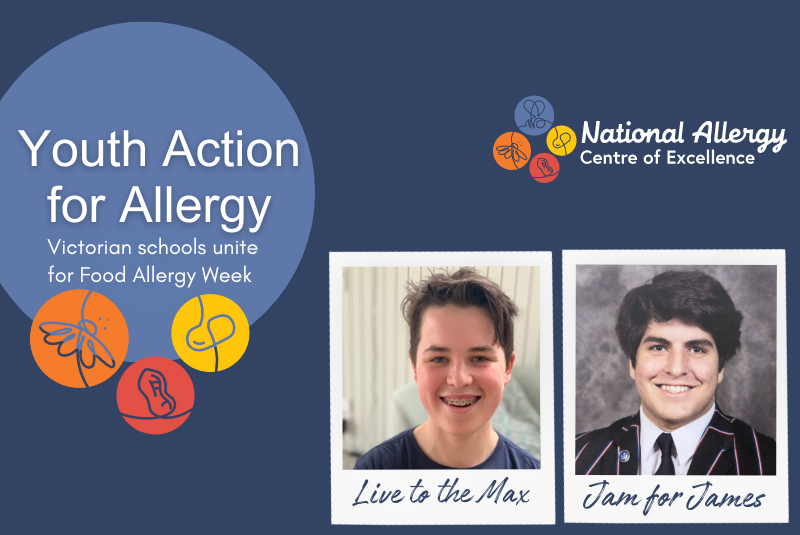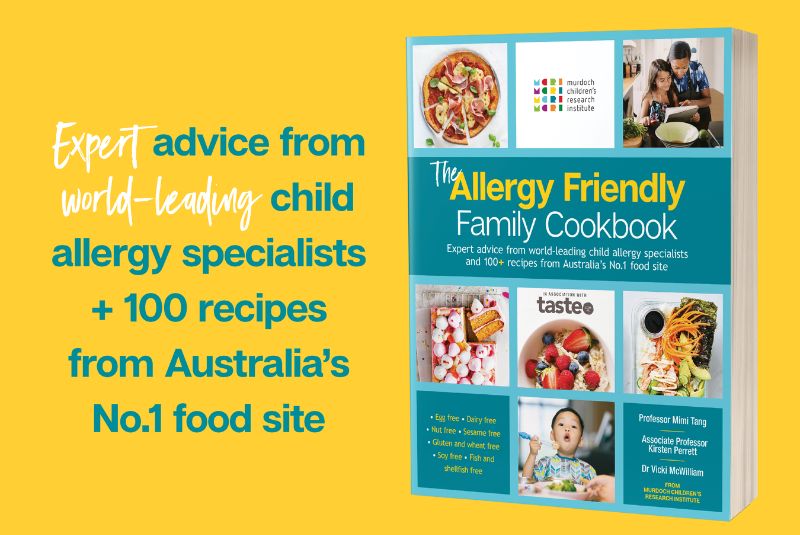Population Allergy
Changing the course of allergic disease. To give every child the opportunity to go to school safely and inform the best care for people living with allergies.
Australia has the highest rates of childhood food allergy globally, with one child in every classroom impacted. Our research shows 10 per cent of 12-month-olds and five per cent of 10- to 14-year-olds have a food allergy.
Drug, insect and respiratory allergic disease rates are also troubling; one in four Australians report having a medication allergy; one in five have allergic rhinitis and 12 people die of bee and wasp sting every year.
The exact cause of Australia’s rise in allergies is unknown. However, our researchers have identified several risk factors for food allergy, including infant diet and eczema.
Since 2007, we’ve recruited over 21,300 participants across 15 projects which investigate 12 different allergies to help learn more and provide relief and hope to families living with food allergies.
Our vision
Our vision is to change the trajectory of allergic disease. To give every child the opportunity to go to school safely and inform the best care for people living with allergies.
Our mission
Our mission is to transform the lives of people living with allergies by hosting world-leading clinical trials, cohort and registry studies, and national research collaborations that make vital discoveries.
Our key impact areas
- Diagnostics, prevention, treatment and management strategies
- Shaping policies and strategies to improve evidence-based care in Australia
- Revolutionising how allergy research is translated and integrated into clinical practice
- Training the next generation of allergy researchers

Image: Murdoch Children's Research Institute's Population Allergy Group
The Allergy Friendly Family Cookbook
World-leading allergy researchers and paediatric specialists Professors Kirsten Perrett and Mimi Tang and Dr Vicki McWilliam have co-authored a cookbook featuring more than 100 allergy-friendly recipes and evidence-based advice for families.

Population Allergy videos
Five food allergy facts with Professor Kirsten Perrett
Asthma and Allergy with Professor Rachel Peters
Food allergy research with Dr Melanie Neeland
National research collaborations hosted by Population Allergy

National Allergy Centre of Excellence – Australia’s peak allergy research body funded by the Australian Government to build the tools and resources needed to accelerate allergy research. Drug, food, insect and respiratory allergy experts have joined the NACE to help improve the lives of five million Australians living with allergic disease.

Centre for Food Allergy Research – An Australia-wide collaboration of food allergy experts, funded by the National Health and Medical Research Council (NHMRC) since 2013. CFAR’s work aims to prevent, treat and manage food allergies, promote the rapid translation of outcomes into clinical practice, and expand the research workforce through training and mentorship.
Group Leaders

Team Leaders


Group Members








Our projects

Aravax AVX-201 Study
A randomised clinical trial evaluating the efficacy and safety of PVX108, a new immunotherapy designed to precisely retrain the immune system to tolerate peanut allergens and reduce the risk of severe allergic reactions. This a sponsored clinical trial funded by Aravax.
Read more...
EarlyNuts Study
A study of 1,933 participants measuring current infant feeding practices and whether earlier allergen consumption has reduced the rate of food allergy. In 2023, participants were invited to a six-year follow up funded by the NHMRC.
Read more...
Egg-Up Trial
This trial is investigating whether gradually introducing egg at home under the careful supervision of an Allergy Specialist Dietitian could help resolve egg allergy in infants.
Read more...
HealthNuts
A study involving 5,300 participants, the HealthNuts Study is the world’s first comprehensive population-based study with an objective measurement of true food allergy. HealthNuts has been funded four times consecutively by the NHMRC to collect measures from age one to 15 years.
Read more...
Low Dose Multi-Nut Oral Immunotherapy in Pre-schoolers (LMNOP) Pilot Trial
A pragmatic randomised controlled trial of low dose multi-nut oral immunotherapy versus standard care to treat multi-nut allergies in young children. The LMNOP Pilot Trial is funded by the Allergy & Immunology Foundation.
Read more...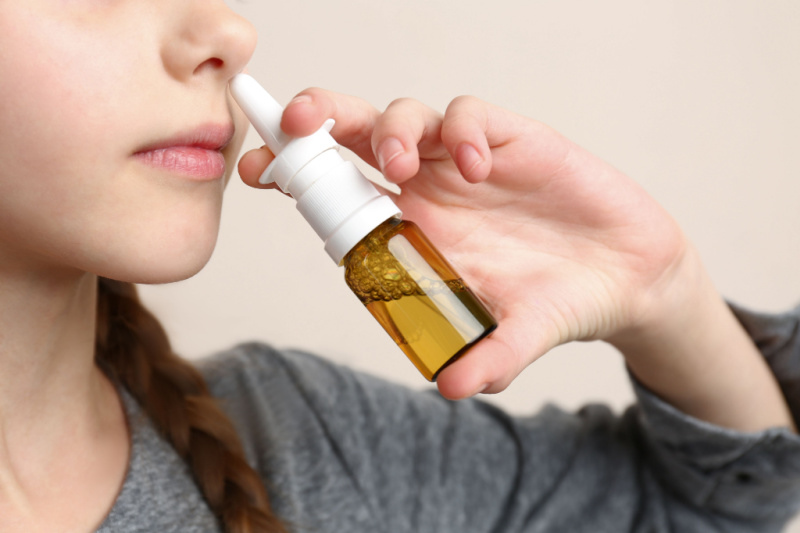
MIST+ trial
MIST+ and MIST are two randomised controlled trials investigating whether medical management (saline +/-steroid nasal spray) improves symptoms of snoring and sleep-disordered breathing in children. MIST+ is funded by the Garnette Passe and Rodney Williams Memorial Foundation.
Read more...
OPTIMUM Study
A randomised clinical trial investigating whether one dose of the whooping cough (‘whole cell’ pertussis) vaccine given at two months of age instead of the current ‘acellular’ pertussis vaccine can help protect against allergic outcomes. This trial is funded by the NHMRC.
Read more...
PrEggNut Study
A randomised clinical trial testing whether the number of eggs and peanuts a mother eats during pregnancy and breastfeeding has an influence on her baby’s food allergy development. The PrEggNut Trial is funded by the NHMRC.
Read more...
Schoolnuts
This study is complete. A study of 9,790 participants that aimed to determine the prevalence of true food allergy in early adolescence, understand risk factors for recurrent or severe accidental ingestion reactions among food allergic children, and determine clinical predictors of food challenge outcomes. SchoolNuts is funded by the NHMRC.
Read more...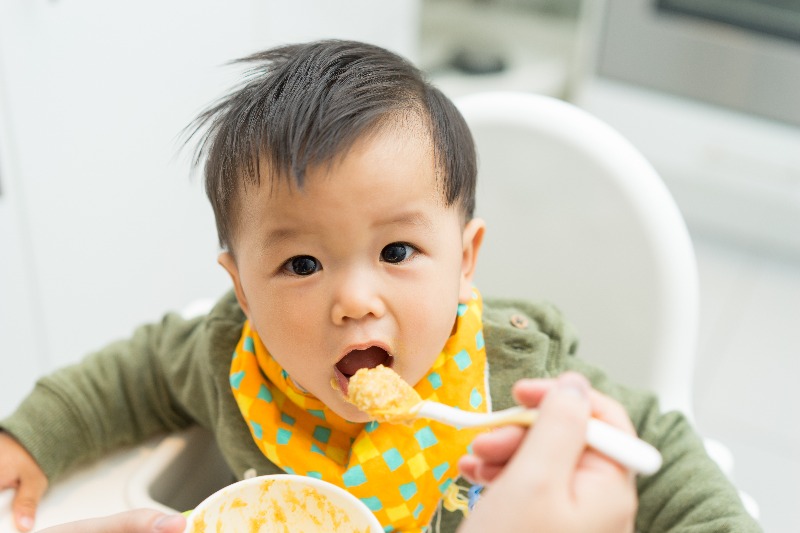
TreEat Study
A randomised clinical trial testing a new model of care for the prevention of tree nut allergy in infants with peanut allergy. It compares a multi-nut oral food challenge versus home introduction of single tree nuts. The TreEAT Trial is funded by the Thrasher and Epworth Medical Foundation.
Read more...
VITALITY Trial
A randomised clinical trial of 2,739 infants aiming to determine if vitamin D supplementation leads to a reduction in challenge-proven food allergy at age one. In 2023, participants were invited to attend a six-year-old follow up. The VITALITY Trial is funded by the NHMRC, National Institutes of Health, Epworth Medical Foundation, Constantinou Foundation and others.
Read more...National Allergy Centre of Excellence

Australia’s peak allergy research body funded by the Australian Government to build the tools and resources needed to accelerate allergy research. Drug, food, insect and respiratory allergy experts have joined the NACE to help improve the lives of five million Australians living with allergic disease.
Centre for Food Allergy Research

An Australia-wide collaboration of food allergy experts, funded by the National Health and Medical Research Council since 2013. CFAR’s work aims to prevent, treat and manage food allergies, promote the rapid translation of outcomes into clinical practice, and expand the research workforce through training and mentorship.
ADORED (Allergic Disease Onset Prevention Study)
A randomised clinical trial testing a live biotherapeutic product (STMC-103H) in high-risk infants for the prevention of allergic diseases. This is a sponsored clinical trial funded by Siolta Therapeutics.
ADAPT Program: Egg-Up
A trial exploring whether a new, home-based, dietitian-led model of care is a safe and feasible treatment pathway for infants with newly diagnosed egg allergy. This program is funded by philanthropic donations.
ADAPT Program: Milk-Up
A randomised clinical trial investigating whether gradually introducing milk at home under the careful supervision of an Allergy Specialist Dietitian could help resolve milk allergy in infants. Milk-Up is funded by the Allergy & Immunology Foundation of Australasia and philanthropic donations.
EPITOPE/EPOPEX
Evaluating the safety and efficacy of a new desensitisation method, called EPicutaneous ImmunoTherapy (EPIT), with the Viaskin® Peanut patch in young children diagnosed with peanut allergy. This is a sponsored clinical trial funded by DBV Technologies.
NOVARTIS
A randomised clinical trial investigating the effectiveness of the medication Ligelizumab in children and adolescents with severe peanut allergy. This is a sponsored clinical trial funded by Novartis.
VITESSE
A randomised clinical trial evaluating the safety and efficacy of an investigational drug patch called DBV712 for children aged between four and seven with peanut allergy. VITESSE is a sponsored clinical trial funded by DBV Technologies.
Funding
- Murdoch Children’s Research Institute
- Department of Health and Aged Care
- Allergy and Immunology Foundation Australia
- Epworth Centre for Paediatric Allergies
- Epworth Medical Foundation
- Melbourne Children’s
- National Health and Medical Research Council
- Royal Children’s Hospital Foundation
- Constantinou Foundation
- The Passe & Williams Foundation
- Immune Tolerance Network
- DBV Technologies
- Novartis
- Siolta Therapeutics
- The Thrasher Research Fund
- Aravax
- National Institutes of Health
Collaborations
- Murdoch Children’s Research Institute
- The Royal Children’s Hospital
- The University of Melbourne
- National Allergy Council
- Australasian Society of Clinical Immunology and Allergy
- Allergy & Anaphylaxis Australia
- Centre for Food Allergy Research
- James Cook University
- The University of Sydney
- The University of Western Australia
- The University of Adelaide
- Monash Medical Centre
- The Children’s Hospital at Westmead
- Women’s and Children’s Hospital, Adelaide
- Robinson Institute, Adelaide University
- Women's & Children's Health Research Institute
- Cork University Hospital
- Food Allergy Center, Massachusetts General Hospital, Boston
- Griffith University
- The University of Queensland
- The University of Manchester
- Telethon Kids Institute
- Perth Children’s Hospital
- The Sydney Children’s Hospitals Network
- UNSW Sydney
- Deakin University
- The Florey Institute of Neuroscience & Mental Health
- Walter & Eliza Hall Institute of Medical Research
Featured publications
Zeyang Shen, Lukian Robert, Milan Stolpman, You Che, Katrina J. Allen, Richard Saffery, Audrey Walsh, Angela Young, Jana Eckert, Kirsten P. Perrett et al. A genome catalog of the early-life human skin microbiome. Genome Biology. Nov 2023
Rachel L Peters, Victoria X Soriano, Kate Lycett, Catherine Flynn, Nur Sabrina Idrose, Mimi L K Tang, Rushani Wijesuriya, Katrina J Allen, Sarath Ranganathan, Adrian J Lowe, Kirsten P Perrett, Caroline J Lodge, Jennifer J Koplin, Shyamali C Dharmage. Infant food allergy phenotypes and association with lung function deficits and asthma at age 6 years: a population-based, prospective cohort study in Australia. The Lancet Child & Adolescent Health. Sept 2023
Greenhawt M, Perrett KP et al. Phase 3 Trial of Epicutaneous Immunotherapy in Toddlers with Peanut Allergy. New England Journal of Medicine. May 2023
Baker A, Grobler A, Davies K, Griffiths A, Hiscock H, Kubba H, Peters RL, Ranganathan S, Rimmer J, Rose E, Rowe K, Simpson CM, Davidson A, Nixon G, Perrett KP. Effectiveness of Intranasal Mometasone Furoate vs Saline for Sleep-Disordered Breathing in Children: A Randomized Clinical Trial. JAMA Pediatrics. Jan 2023
Victoria X. Soriano, Rachel L. Peters, Margarita Moreno-Betancur et al. Association Between Earlier Introduction of Peanut and Prevalence of Peanut Allergy in Infants in Australia. JAMA. Jul 2022
Brettig, T., Dang, T., McWilliam, V., Peters, R.L, Koplin, JJ., Perrett, KP. The Accuracy of Diagnostic Testing in Determining Tree Nut Allergy: A Systematic Review. Journal of Allergy and Clinical Immunology-In Practice. May 2021
Peters, R. L., Barret, D. Y., Soriano, V. X., McWilliam, V., Lowe, A. J., Ponsonby, A. -L., Koplin JK, Perrett, K. P. No cashew allergy in infants introduced to cashew by age 1 year. Journal of Allergy and Clinical Immunology. Jan 2021
Soriano VX, Peters R, Ponsonby A-L, Dharmage S, Perrett K, Field M, Knox A, Tey D, Odoi S, Gell G, Perez B, Allen K, Gurrin L, Koplin J. Earlier ingestion of peanut following changes to infant feeding guidelines: The EarlyNuts Study. Journal of Allergy & Clinical Immunology. Nov 2019
Perrett KP, Jachno K, Nolan TM, Harrison LC. Association of Rotavirus Vaccination with the Incidence of Type 1 Diabetes in Children. JAMA Pediatrics. Jan 2019
Peters, R. L., Koplin, J. J., Gurrin, L. C., Dharmage, S. C., Wake, M., Ponsonby, A. -L., . . . Study, H. The prevalence of food allergy and other allergic diseases in early childhood in a population-based study: HealthNuts age 4-year follow-up. Journal of Allergy and Clinical Immunology. Jul 2017


